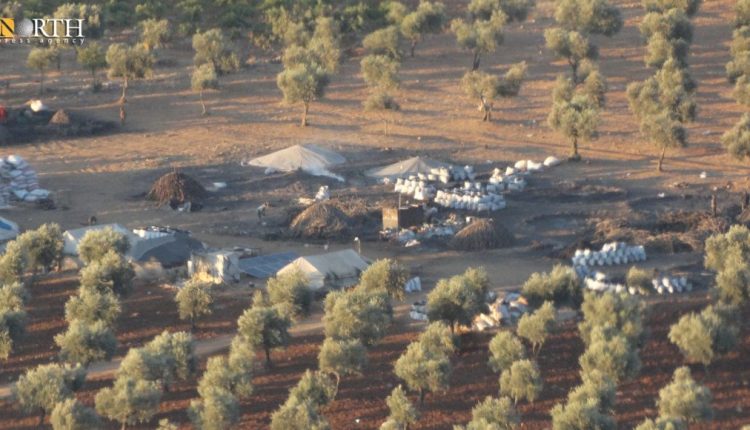AFRIN, Syria (North Press) – For the sixth consecutive year, farmers and residents in Afrin region, Northwest Syria, face heavy royalties and restrictions from Turkish-backed armed opposition factions, aka the Syrian National Army (SNA). These practices have intensified during this year’s olive harvest season, targeting local agriculture, trade, and resources, which form the backbone of Afrin’s economy.
Increased restrictions and control
This harvest season, SNA factions have tightened their hold on Afrin’s economic resources, imposing new royalties and restrictions. According to Mahmi Abdo, a pseudonym for an olive field owner in Afrin’s countryside, the Sultan Murad faction, under the leadership of Fahim Issa, has appointed Abu Walid al-Izza to oversee agricultural activities.
Abdo explained to North Press that the faction recently invalidated all legal powers of attorney previously granted by absent olive tree owners to local representatives in Afrin.
This has impacted individuals representing families who have left Afrin for regions controlled by the Autonomous Administration of North and East Syria (AANES) or who have gone abroad. Abdo, who previously managed properties for over ten people, said all these authorizations have now been revoked.
As a result, the faction has seized olive harvests, despite the high costs owners have incurred over the years to maintain their lands. Residents still in Afrin now face additional taxes and royalties of up to 15–25 percent on their olive crops, alongside reports of outright theft and property confiscation.
Factional levies on farmers and olive presses
Ahmad Mesto, a pseudonym for an olive press owner in Afrin’s countryside, different SNA factions are enforcing varying fees on harvests within their areas of control. For instance, the Sultan Suleiman Shah Division (al-Amshat), led by Muhammad Jassem, known as Abu Amsha, imposed a fee of $3.50 per olive tree in Mabata district and surrounding villages. In Sheikh Hadid (Shiyeh) district, a $10 fee per tree was required from individuals holding power of attorney for absent owners.
Residents still in Afrin are also charged over 10 percent of their seasonal harvest, along with a $5,000 fee for each operating olive press in al-Amshat’s territory.
Mesto noted that the faction mandates pressing olives within its mills, barring transport to other areas and threatening violators with imprisonment.
The Hamzat Division similarly canceled all powers of attorney, implementing a $2 “protection fee” per tree and taking 15–20 percent of olive oil produced by residents. Olive pressing outside faction-controlled mills is strictly prohibited, further limiting local economic independence.
Confiscation and forced levies on olive oil production
Ibrahim Kalo, a pseudonym for an olive oil trader in Afrin, said that Ahrar al-Sharqiya, another SNA faction, has imposed a tax of more than 40 percent on oil production this year. The faction collects its share directly from mills or demands payment through its economic office.
Kalo added that the al-Muntasir Billah faction, another SNA division, has not only revoked legal powers of attorney but has also leased olive trees to outsiders, imposing a 15 percent tax on oil production for those who remain in Afrin.
Extensive looting has also been reported under the guise of punishing unauthorized representation in areas controlled by this faction.
The Sham Legion and Ahrar al-Sharqiya added further burdens by demanding 30–40 percent of olive crops, collected directly from farmers at the mills. What was once a vital season for Afrin’s farmers has become an ordeal marked by exploitation and loss, with military force used to secure these factions’ financial gains.
Impact of prolonged conflict and displacement
Since Turkey’s “Operation Olive Branch” in 2018, the Turkish-backed SNA factions have held control over Afrin, resulting in the displacement of approximately 300,000 Kurdish residents, many of whom [until they were recently once again displaced by Turkey-backed SNA factions resided] in Aleppo’s northern countryside, locally known as the Shahba region.
The ongoing exploitation of Afrin’s olive industry has compounded the hardship faced by those who remain, with no accountability in place to protect their livelihoods from factional abuses.

